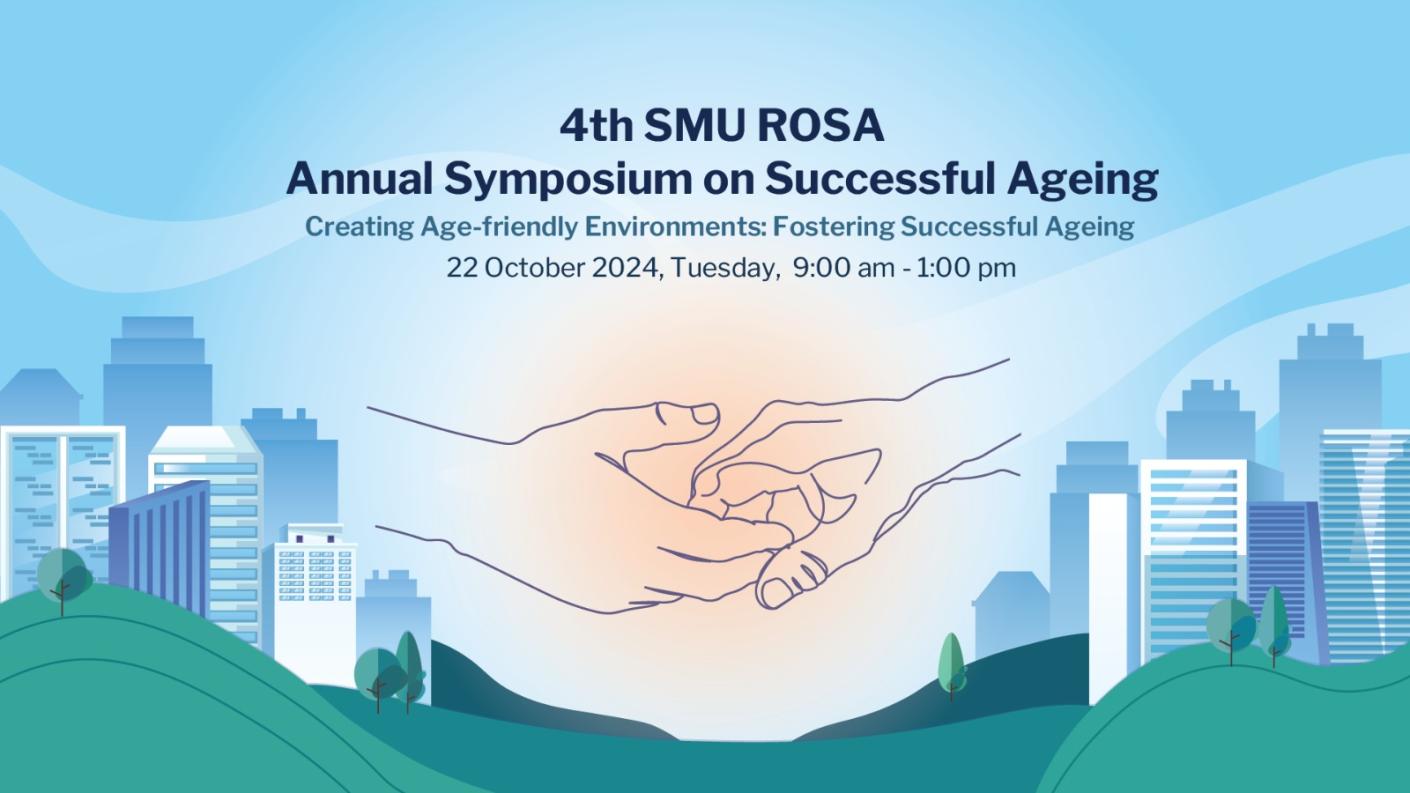
4th SMU ROSA Symposium on Successful Ageing
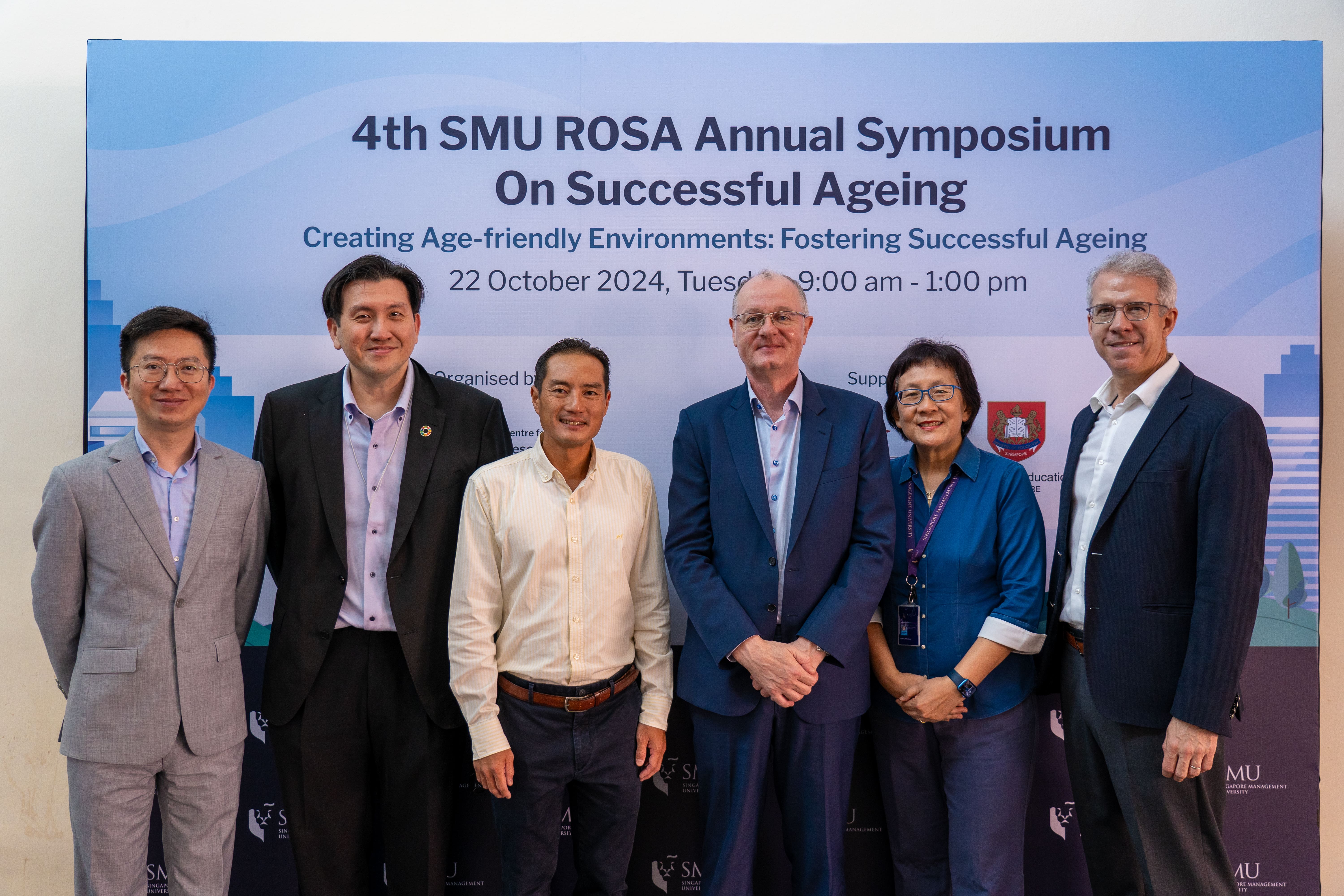 |
|
From Left: Professor Jia Li (Dean, School of Economics, SMU), Dr Cheong Wei Yang (Vice-Provost, SMU), Mr Tan Kiat How (Senior Minister of State, Ministry of Digital Development and Information, and Ministry of National Development), Professor Timothy Clark (Provost, SMU), Professor Paulin Straughan (Director, ROSA, SMU), Professor Kenneth Benoit (Dean, School of Social Sciences, SMU) |
|
This year, ROSA held its 4th SMU ROSA Annual Symposium on Successful Ageing on 22 October 2024, both online and in-person at the SMU Mochtar Riady Auditorium. The theme of the symposium was “Creating Age-Friendly Environments: Fostering Successful Ageing”, in which the symposium explored how research and policies influence the well-being and community integration of older adults. In particular, the symposium focused on ageing-in-place and featured discussions among academic experts on policies that can be implemented to foster a conducive environment for ageing in place. In total, about 312 participants attended the symposium both in person and online. Of the 215 participants who attended the event in-person, 44 were our members from ROSA’s Singapore Life Panel®. |
WELCOME ADDRESS
Professor Timothy Clark, Provost of SMU
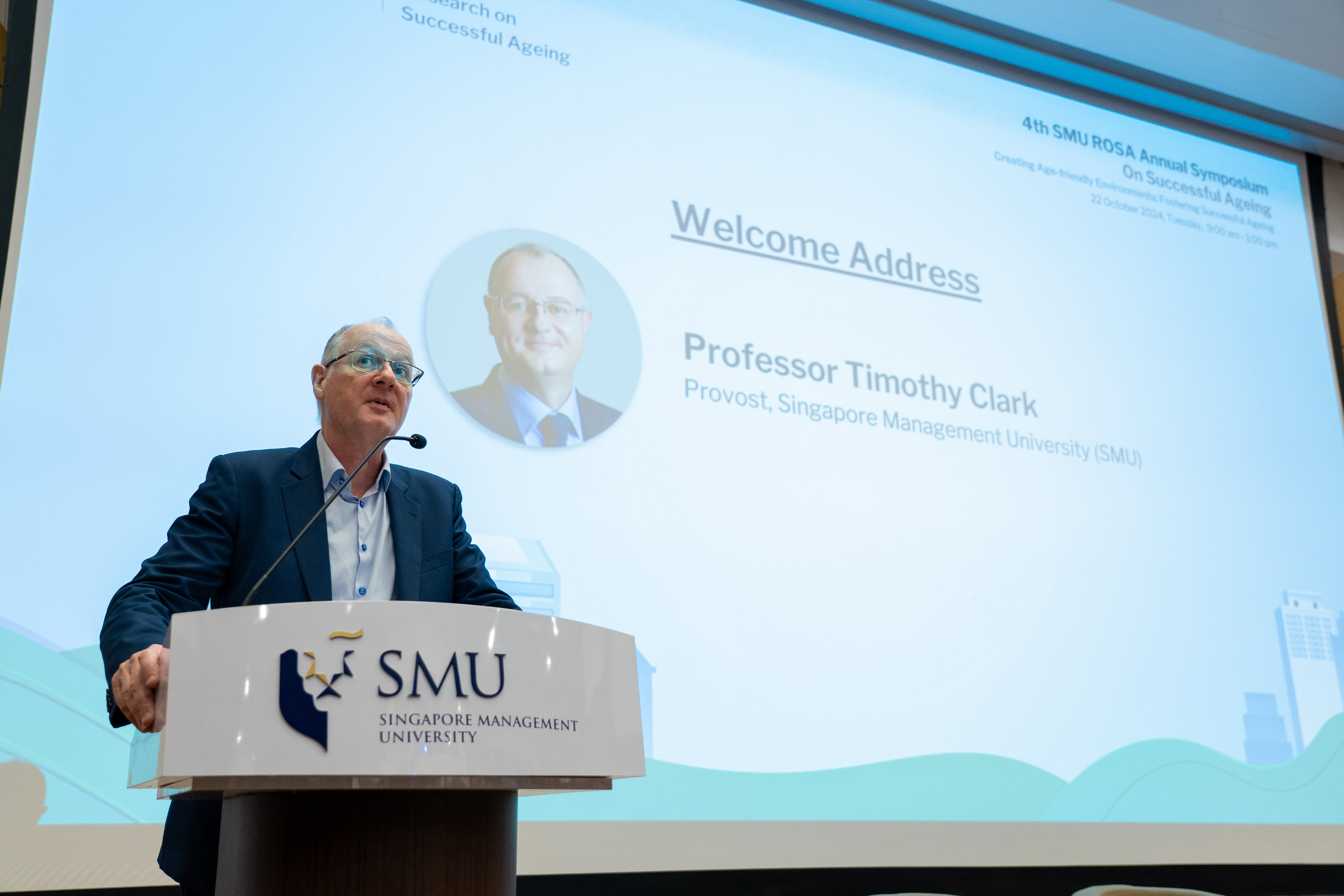 |
|
Professor Timothy Clark giving his welcome address |
|
Professor Timothy Clark, Provost of SMU, opened the 4th SMU ROSA Annual Symposium with an insightful welcome address where he highlighted the benefits of ageing-in-place in maintaining older adult well-being as Singapore approaches a super-aged society. He also acknowledged the lack of comprehensive data and limited research on ageing-in-place in Singapore and called on ROSA to explore how the built and social environments contribute to ageing-in-place, as well as research on the broader implications of ageing-in-place for older adults and its implications for policy. |
GUEST OF HONOUR'S ADDRESS
Mr Tan Kiat How, Senior Minister of State for Communications and Information, Senior Minister of State for National Development
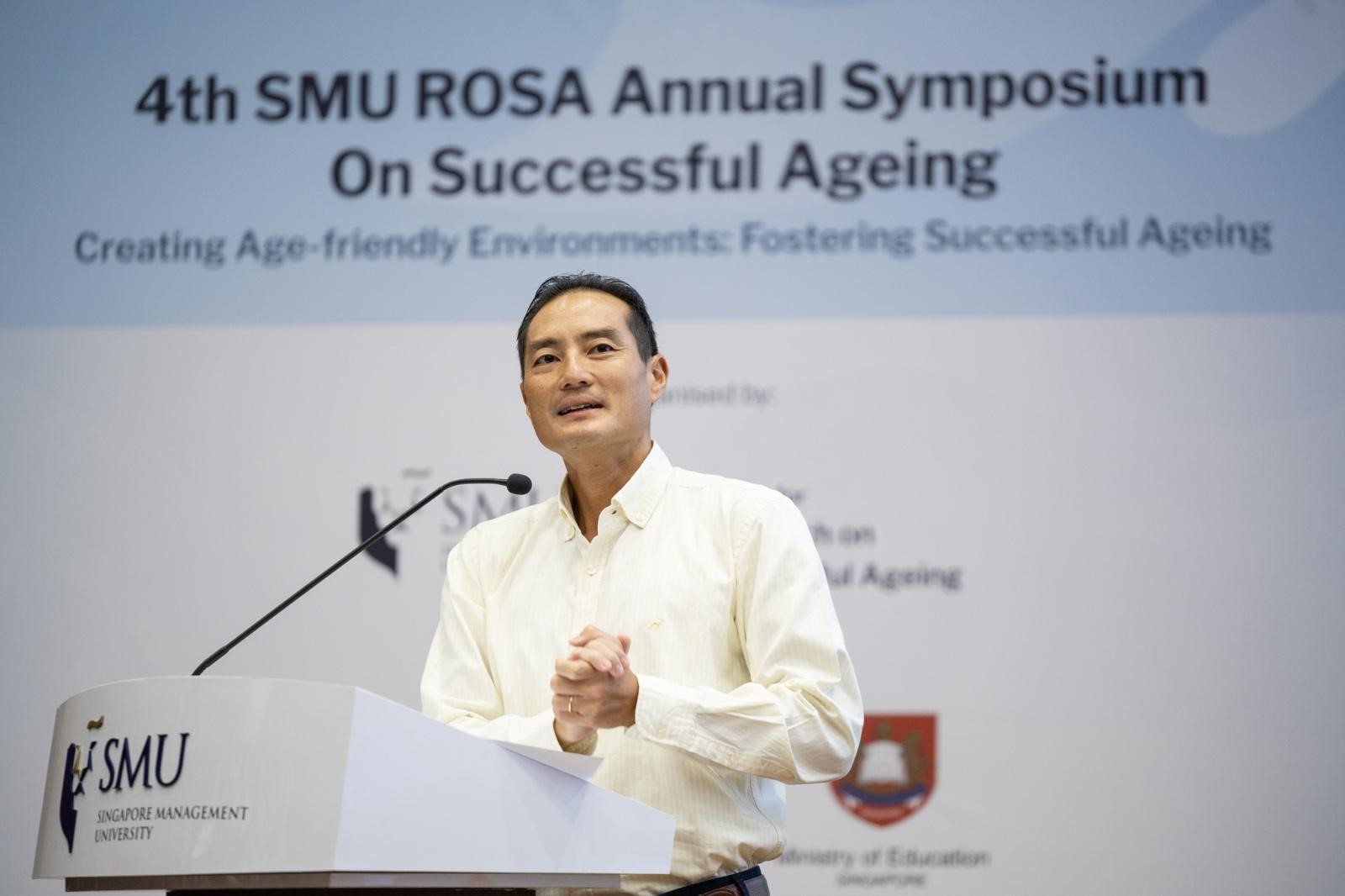 |
|
Mr Tan Kiat How giving the Guest of Honour's address |
|
It was our great pleasure to have Mr Tan Kiat How, Senior Minister of State for Communication and Information and Senior Minister of State for National Development, provide his guest of honour’s address at the symposium this year. Mr Tan acknowledged that Singapore stands at the cusp of a demographic shift with longer life expectancy and declining birth rates and faces the key challenge of enabling seniors to grow old while keeping healthy. He also noted that studies have shown that environmental factors account for more than half of health outcomes. Therefore, a whole-of-society approach comprising improving physical living environments and community-led initiatives to empower older adults is needed to meet the needs of seniors. He highlighted Project Silverlight, a year-long pilot intervention by ROSA that sought to enable older adults to organise themselves and curate their own social agenda as a key example of such community-led initiatives, and hoped that there would be more similar projects that empower seniors in their communities. |
PRESENTATIONS
1. Asia Development Policy Report 2024 — Ageing Well in Asia, by Dr Aiko Kikkawa, Senior Economist at the Asian Development Bank
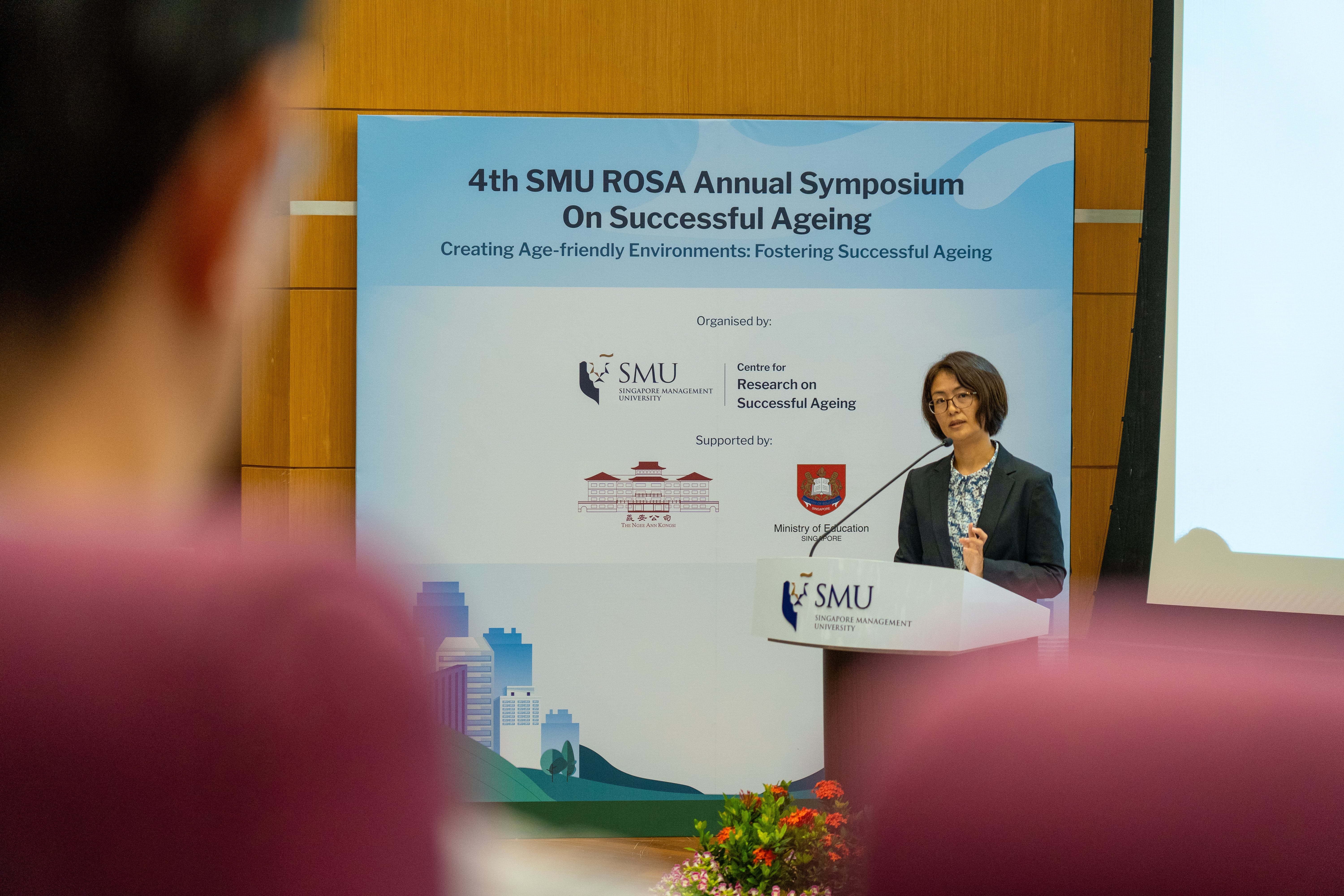 |
|
Dr Aiko Kikkawa giving her presentation |
|
In her presentation, Dr Kikkawa explained key findings from the Asian Development Bank’s latest development policy report, which looked at ageing as a megatrend in Asian societies. One key finding the report illuminates is that while Asia is ageing more rapidly than the rest of the world, it is still unprepared to face the challenges of this phenomenon. There is an imperative need for Asia to step up its efforts to ensure healthy ageing for all Asians. To this end, Dr Kikkawa noted that healthy ageing requires effective universal health coverage and active health promotion, such as offering free health check-ups, promoting a healthier lifestyle, sin taxes on tobacco and unhealthy food products. Some other key findings of the presentation include:
|
2. Clue to Successful Ageing: What have We Learnt, by Prof Paulin Straughan, Director of ROSA
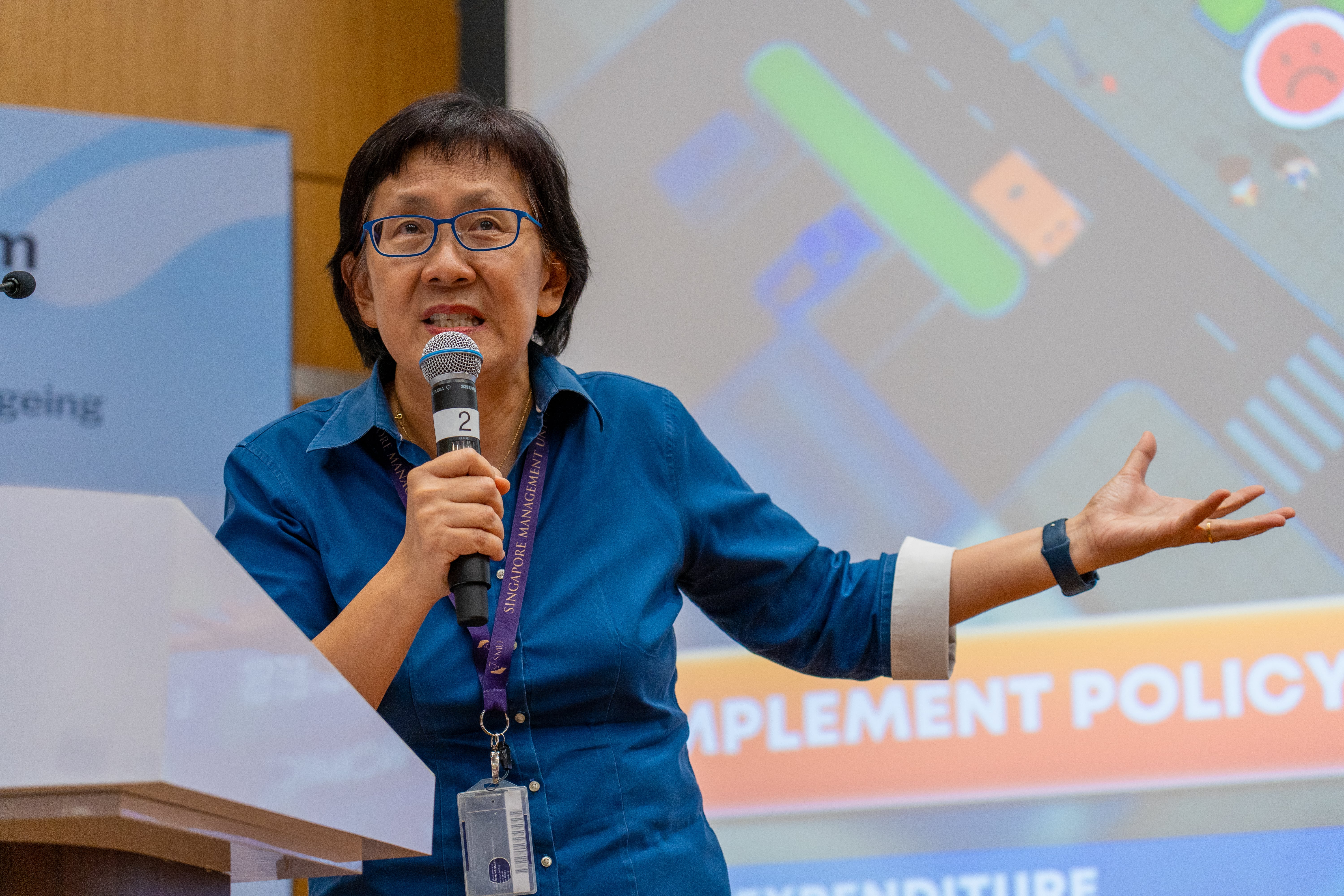 |
|
Professor Paulin Straughan giving her presentation |
|
In her presentation, Professor Straughan showcased ROSA’s latest research on ageing-in-place — a proposed conceptual framework for ageing in place which poised ageing-in-place as an influence on well-being by inducing a sense of attachment (which comprises place identity, continuity, and social inclusion) in older adults. The framework also notes that ageing in place is, in turn, influenced by both the social and built environment of one’s neighbourhood. She noted that although ageing-in-place is a social construct, it must be defined objectively for policymakers and urban planners to better make use of it during district planning. Key findings that she presented include:
Professor Straughan then showed a video and live demonstration of SMU City 2026, a virtual simulation prototype that seeks to showcase the effects of policies on economic, mental, physical, and social well-being. She hopes that further development of this prototype will benefit policymakers, voluntary welfare organisations (VWOs), and urban planners to determine the best policies to improve the well-being of older adults in Singapore. |
DISCUSSION SESSION
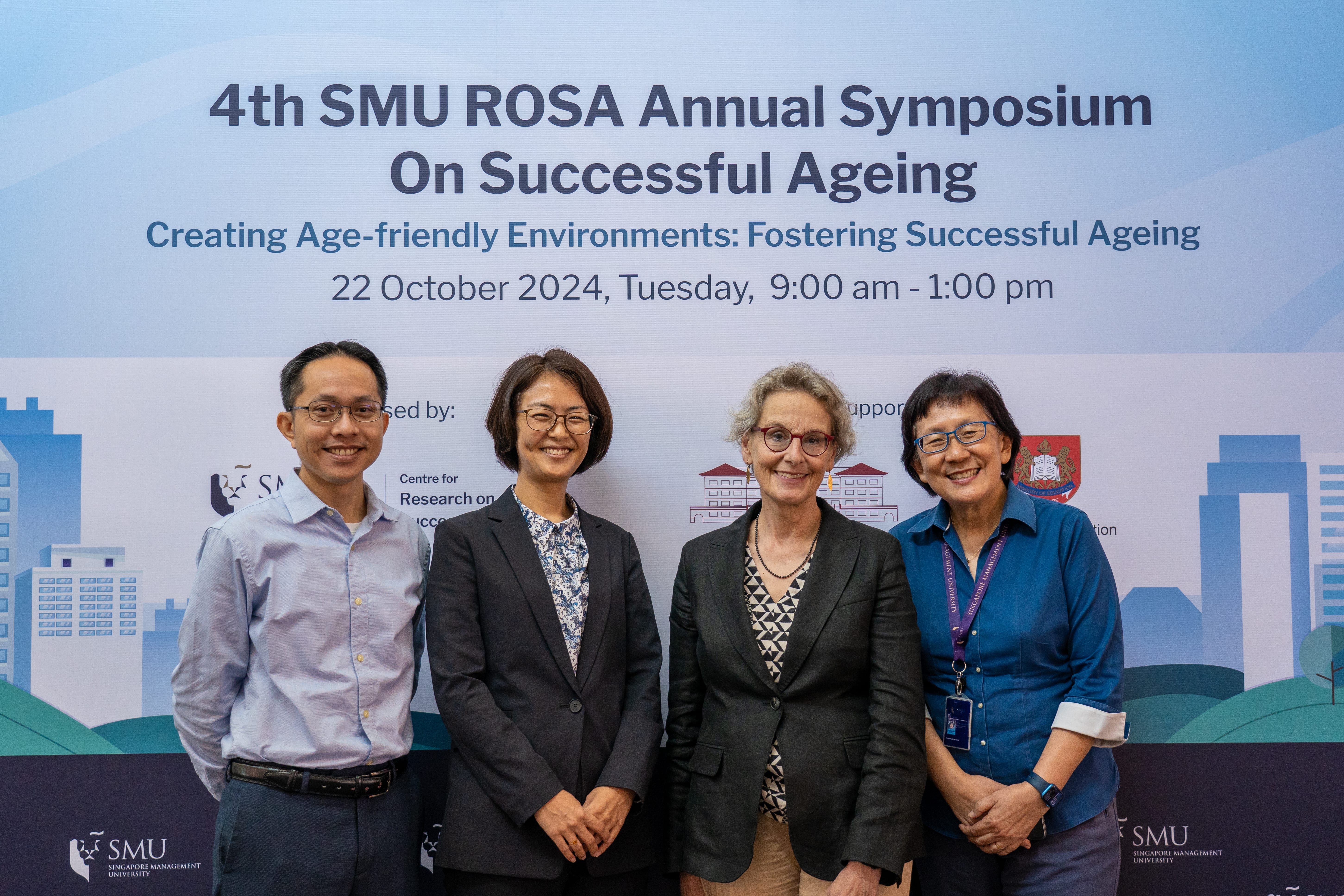 |
|
From Left: Assoc Professor William Tov (Co-deputy director, ROSA, SMU), Dr Aiko Kikkawa (Senior Economist, Asian Development Bank), Professor Ursula Staudinger (Rector, Technische Universität Dresden), Professor Paulin Straughan (Director, ROSA, SMU) |
|
Dr Aiko Kikkawa and Professor Straughan were joined by fellow panellist Professor Ursula Staudinger, Rector of Technische Universität Dresden, for a lively discussion session focusing on the strategies to support older adults to age in place. The discussion was moderated by ROSA’s co-deputy director, Associate Professor William Tov. Professor Ursula Staudinger kick-started the discussion by sharing her thoughts on how government policies in the form of urban planning, such as having communal amenities for all ages and mandated parental or caretaker leaves, could produce a more conducive environment for older adults to successfully age in place. Professor Kikkawa shared her opinions on the need for current systems to accommodate the evolving needs of working women. She also talked about her experience with the Wakaba-dai Housing Complex, an ageing estate in Yokohama that was specially curated to promote ageing in place. By having such specialised housing complexes, older adults will thus have more opportunities to engage in intergenerational and social interactions, in turn increasing their social capital. Professor Straughan suggested that Singapore leverage its existing resources and use them to create spaces that enable intergenerational activities and interactions. |
CONCLUSION
|
The ROSA team would like to extend our heartfelt gratitude to our Guest of Honour, Senior Minister of State Mr Tan Kiat How for gracing our symposium this year. We would also like to thank Professor Timothy Clark, Provost of SMU, for his support of ROSA’s work and for delivering the welcome address and to our esteemed panellists for their enriching presentations and discussions. Last but not least, we would like to extend our appreciation to all our fellow colleagues, students, guests, and Singapore Life Panel® members who contributed meaningfully to the discussions, without whom our event would not have been brought to life. To view the highlights of the event, please click here. This event was made possible with the generous support of The Ngee Ann Kongsi. As always, please reach out to rosa@smu.edu.sg should you have any queries about this event or future ones! |